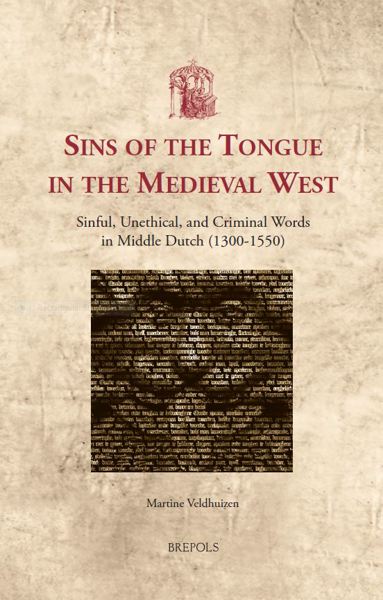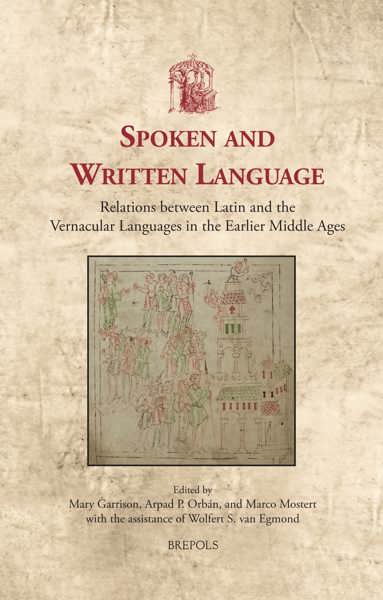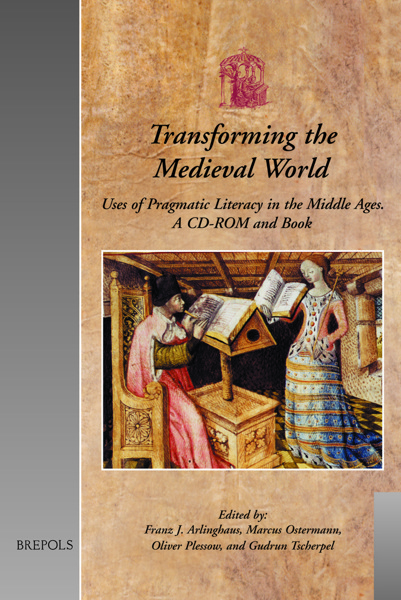
Trust, Authority, and the Written Word in the Royal Towns of Medieval Hungary
Katalin Szende
- Pages: xx + 416 p.
- Size:156 x 234 mm
- Illustrations:50 b/w, 12 tables b/w.
- Language(s):English
- Publication Year:2018
- € 110,00 EXCL. VAT RETAIL PRICE
- ISBN: 978-2-503-57881-1
- Hardback
- Available
- € 110,00 EXCL. VAT RETAIL PRICE
- ISBN: 978-2-503-57882-8
- E-book
- Available
A comprehensive overview of the formation of urban pragmatic literacy in the medieval Kingdom of Hungary.
“Szende’s work bears witness to her rich knowledge of the relevant archival materials and the astonishing amount of literature on the subject. Not least, her language skills covering English, French, German, Hungarian, Latin, and Slavic and her embeddedness in a modern network of colleagues active in similar fields of research contribute decisively to the high standard and quality, and also to the elegance and erudition of this book.” (Ferdinand Opll, in Speculum, 95/3, 2020, p. 913)
« Das Buch von Katalin Szende ist eine gut strukturierte und lesbare Synthese über pragmatische Schriftkultur in einem ausgedehnten Teil Ostmitteleuropas. Wegen der reich kommentierten einheimischen (nicht nur ungarischer, sondern auch slowakischer, rumänischer, kroatischer) Fachliteratur kann man das Werk allgemein auch Forschern, die einen modernen Einstieg in die Geschichte des mittelalterlichen Königreichs Ungarn suchen, empfehlen. Hervorzuheben ist auch das Bemühen der Autorin, die pragmatische Schriftlichkeit im Kontext mit zwei weiteren Hauptgattungen der Schriftkultur zu sehen – nämlich mit der kodikologischen und epigraphischen Schriftlichkeit. Ein Werk, das es sich lohnt zu lesen. » (Juraj Šedivý, in Mitteilungen des Instituts für Österreichische Geschichtsforschung, 129/2, 2021, p. 453)
This book is the first comprehensive overview of how written administration was established in the royal towns of medieval Hungary. Using the conceptual framework of trust and authority, the volume sheds light on the growing complexity of urban society and the impact that the various uses of writing had on managing this society, both by the king and by the local magistrates. The present survey and analysis of a broad range of surviving sources reveals that trust in administrative literacy was built up gradually, through a series of decisive and chronologically distinct steps. These included the acquisition of an authentic seal; the appointment of a clerk or notary; setting up a writing office; drawing up town books; and, finally, establishing an archive from the assemblage of collected documents.
Although the development of literacy in Hungarian towns has its own history, the questions posed by the study are not unlike those raised for other towns of medieval Europe. For instance, both the gradually increasing use of various vernaculars and the controversial role of writing in Jewish-Christian contacts can be meaningfully compared with similar processes elsewhere. The study of Central European towns can therefore be used both to broaden seemingly disparate research frameworks and to contribute to studies that take a more general approach to Europe and beyond.
- Acknowledgements
- Abbreviations
- List of Figures and Tables
- On This Volume
- Trust and Authority
- Literate Mentalities
- European Frameworks
- Whose Literacy? Urban Development and Urban Society in Medieval Hungary
- Pragmatic Approaches to Pragmatic Literacy
- Sources and Scholarship
- Royal Charters and Urban Identity
- The Beginnings of Civic Literacy
- Civic Literacy and Places of Authentication
- Formulae and Community
- The Municipal Seal: the Matrix of Identity
- Communal Concerns: The Contents of Early Municipal Documents
- Conclusions: Trust in Charters
- The Institutionalisation of Writing Offices
- Municipal Books as Instruments of Civic Governance
- The Material of Town Books: The Use of Paper in Administration
- The Contents of Municipal Books: Thematic Differentiation
- Outlook 1: The Beginnings of Pragmatic Literacy in Craft Guilds
- Outlook 2: Town Chronicles and Municipal Literacy
- Conclusions: Trust in Municipal Books
- Language on the Research Agenda
- Why Not Monolingual?
- Areas of Urban Life Where Language Became an Issue
- Medieval Urban Language Use in the Light of Sociolinguistic Research
- Conclusions: Trust in Language
- Legislation on Jews and Literacy – A Chronological Overview
- Records of Urban Administration as Sources on Jewish-Christian
- Conclusions: Trust in Writing between Christians and Jews
- Variations on Archives
- The Advent and Advantage of Civic Archives: Storage and Safekeeping
- Binding Records: The Example of Sopron
- Using Civic Archives
- Conclusions: Trust in Archives
Appendices
- Appendix 1: Gazetteer of Names of Towns in the Medieval Kingdom of Hungary Discussed in the Book
- Appendix 2: Regnal Years of the Kings of Medieval Hungary
- Appendix 3: Documents Issued by Civic Authorities in Hungary, (1244) 1255-1305
- Appendix 4: Earliest Mentioning of Municipal Notaries (up to 1400)
- Appendix 5: The Earliest Preserved Charters of Bishops’ Towns (Issued by the Municipality)
- Appendix 6: Municipal Books Started before 1500
Bibliography
Index




